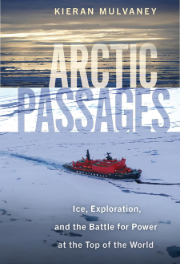Arctic Passages: Ice, Exploration and the Battle for Power at the Top of the World

Kieran Mulvaney
Island Press, £24.00
The Northwest Passage in the Arctic brings to mind tales of adventure and tragedy, like the daring exploits of Sir John Franklin and his crew, and the many others who tried and failed to navigate through the ice. The allure of this passage lies in its potential to shorten the sailing time between Europe and the east coast of America and Southeast Asia. Today, this challenge is being overcome, partly due to advancements in ship design that allow vessels to cut through ice floes, but mainly because climate change has reduced the extent of Arctic sea ice during the summer months.
In his book Arctic Passages, Kieran Mulvaney explores the history and geopolitics of the three main Arctic routes: the Northwest Passage, the Northeast Sea Route, and the Transpolar Sea Route across the pole. While these new sea routes may speed up the delivery of goods, they have significant impacts on the lives and livelihoods of Arctic residents, including indigenous peoples who have lived there for generations. The warming climate is also devastating wildlife and ecosystems.
Kieran, a journalist and excellent writer, helps us navigate the complexities of the Arctic nations jockeying for position. I loved this book because it provided insights into a world that is both distant and somewhat out of mind, yet serves as a stark reminder of the profound effects humans are having on the planet.
Professor Iain Gordon FRSB
Kieran Mulvaney is an author and specialist in whaling, fisheries and other ocean issues. He was co-founder of the Whale and Dolphin Conservation Society and has worked in various capacities with Greenpeace, International Fund for Animal Welfare (IFAW) and Polar Bears International (PBI).


